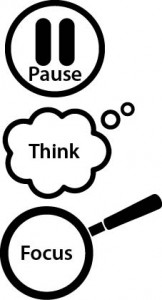Coca Cola first introduced this marketing slogan more than 80 years ago. If you ask me, they were way ahead of their time.
More and more I’m recommending to clients and keynote audiences to take time out of their busy day to pause and refresh. Only I’m not referring to drinking carbonated beverages as a way to quench a thirsty body. I’m talking about taking time to pause and refresh their brains.
These days, few things are more important for business leaders than pausing to think about what we’re doing. Otherwise, we end up reacting to everything that comes our way rather than proactively focusing on what we need to do to get our organizations where they need to go.
The faster the world goes – and it moves faster every day – the more we tend to shortcut the process of thinking. To keep up with this frenetic pace, we have trained ourselves to believe that we always need to be doing something. So we feel more comfortable running in any direction (often without our team in the same race) than we do pausing to make sure we’re running in the right direction, with our team aligned and running with us.
For example, we run into meetings unprepared, unsure of what is on the agenda or even what the meeting is supposed to accomplish. We forego feedback because “they will figure it out.” We limit research or exploration into what others are doing, or have done, that we could leverage. The list of all the different ways we run with no real direction goes on and on.
Reacting rather than thinking does not support achieving our vision of winning. Yet we do it anyway because thinking is much more taxing than responding instinctually or with our other senses. To give rational consideration to ideas and plans requires more effort and willpower. Above all, it requires slowing down to actually use our brains versus giving in to intuition. This doesn’t mean we avoid trusting our gut some of the time. But when every decision or action results from intuition rather than rational thinking, the quality of the results significantly declines.
The solution lies in an activity that the best athletes, musicians, and craftsmen (and women) do all the time – practice. The more technology enables us to move faster in most areas of our life, the more critical it becomes to practice thinking each and every day. Practice creates the habits and ways of working that allow us to slow down just enough. Good intentions won’t cut it. We have to “do” to re-wire our brains, and that starts with practice.
How can you carve out time each day, throughout the day, to conduct “practice drills”? These drills might only take 30 seconds to ponder “what if?” or imagine another perspective, or get clear on your limiting constraints so you can move beyond them.
Try using a 3-minute timer to remind yourself to start each day focused on winning and moving towards it. Three minutes seems like forever when you get quiet and ponder how to make sure your day, your time, and your energy are directed on the right things that move you closer to your destination points.
Put sticky notes on your desk or PC, reminding you to pause and ask one “what if?” question. Don’t worry about answering it right away. Just ask the question and ponder it for a few minutes.
Send yourself an email. Set your smart phone to ping you several times a day. Take a walk at lunchtime. On the drive home from work, instead of mentally reviewing the day, think about what could be instead of what is. The cues you can use to prompt yourself to begin practicing thinking are limited only by your imagination.
It also helps to set aside time each day to think about nothing. Sit in a quiet place, relax, focus on your breathing, and just let the mind quiet down. Yes, it can be hard to carve out even this short amount of time from your daily schedule. But once you get in the habit of doing it, you’ll be amazed at its ability to recharge your batteries.
Refreshing the brain is good for the body, good for the soul – and good for your business. To coin another well-known marketing phrase: try it, you’ll like it!
Call to action: Identify one cue to prompt yourself to begin practical thinking on a daily basis.









